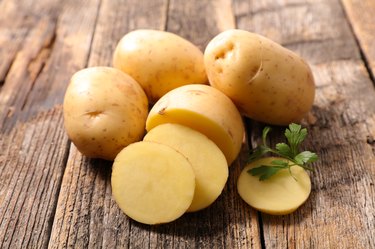
Potatoes are an excellent source of healthy, complex carbohydrates and can be included in just about any dish. Although it's one of the healthiest ways to prepare this starchy vegetable, boiling can cause the potatoes to turn dark after they're peeled.
But don't fret: Darkening potatoes is just a side effect of oxidation and isn't anything you need to worry about where safety is concerned. If you're prepping a dish for a potluck meal or family dinner, there are a few tricks to avoid your taters turning on you.
Video of the Day
Video of the Day
Ways to Prevent Potatoes from Turning Brown
Boiling is a popular way to prepare the vegetable and is among the most weight-loss-friendly, as it requires no additional oil. Boil your potatoes with the skin on while using minimal water, almost as if you're steaming them, Kristi Mathieson, RD, recommends. You'll know your potato is done once you can smoothly poke through it with a fork.
Once you peel your boiled potato, you may notice the potato darken in color. This usually happens when the potato is exposed to air, Mathieson explains. "This darkening is caused by oxidation of the ferri-chlorogenic acid in the boiled potato," she says.
If you want to avoid a dark potato, follow these easy steps:
- Cut the potatoes and place them in a covered pot of cold water. Starting with cold water will ensure the potatoes are uniformly cooked, Mathieson says.
- Drain the water immediately after boiling. Avoid rinsing the potatoes in cold water immediately after boiling, as this can lead to sogginess.
While cooking with cold water can help prevent dark spots on your boiled potatoes, there's no guarantee you'll be able to prevent oxidation. However, oxidized potatoes are totally safe to eat, so no need to worry too much about any post-boiling darkness. Plus, a brown potato won't taste any different than its white counterpart.
If you notice dark spots on your potatoes before boiling, however, you may want to cut away the dark portions of the vegetable. Usually these are just bruises due to bad handling, according to Mathieson. As with darkening due to oxidation, slightly bruised potatoes are still generally safe to eat.
Tip
If you're preparing a potato dish, consider including white, orange and purple potato varieties, Mathieson recommends. Different types of potatoes contain different antioxidants, which can be helpful in fighting free radicals, aka toxins found in the environment.
Why You Should Include Potatoes in Your Diet
Low in calories, potatoes make a healthy source of carbs to include in a meal or eat before a workout. A medium-sized potato totals about 164 calories with 4.3 grams of protein, 37 grams of carbohydrates and 4.5 grams of fiber, according to the USDA.
Potatoes, pumpkin, parsnips, yams and squash are just a few examples of starchy vegetables. Starchy vegetables are a healthy carb source that are not only versatile but high in nutrients like fiber, according to the FDA. Found in most fruits and vegetables, fiber helps promote healthy digestion and satiety.
Fiber can also help promote a healthy gut, according to Mathieson. Potatoes are rich in phytonutrients, which are known for their ability to feed and help improve your gut microbiota. In the long run, this can help improve your gastrointestinal health.